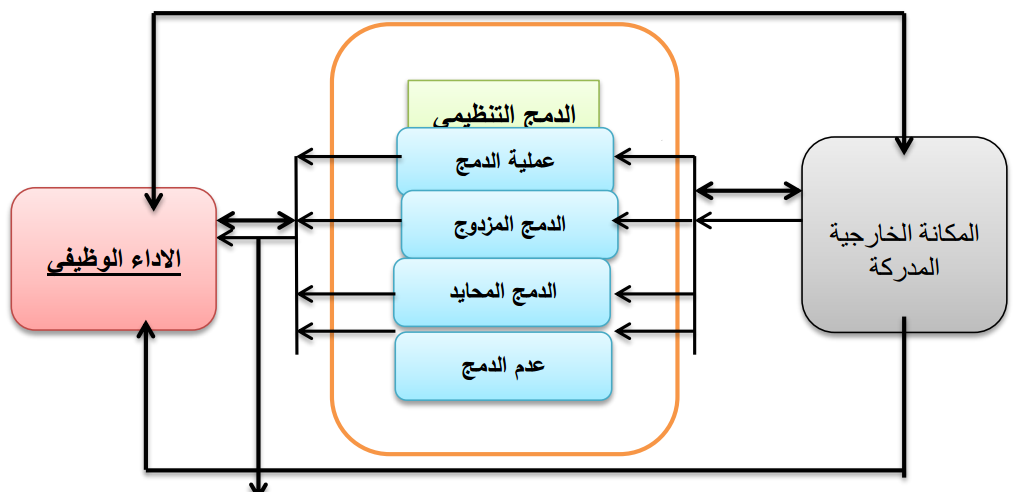توظيف المكانة الخارجية المدركة من خلال الدمج التنظيمي في تعزيز الاداء الوظيفي للتدريسين -بحث تحليلي في كليات جامعة كربلاء
الكلمات المفتاحية:
المكانة الخارجية المدركة، الدمج التنظيمي، الاداء الوظيفيالملخص
يسعى هذا البحث إلى تحديد أثر المكانة الخارجية المدركة في الاداء الوظيفي، ومن أجل تحقيق ذلك، تم اعتماد المكانة الخارجية المدركة كمتغير توضيحي وتم التعبير عن الدمج التنظيمي بوصفه متغيرا وسيطا بالأبعاد (وجود الدمج, وعدم الدمج, والدمج المحايد, والدمج المزدوج), فيما تم التعبير عن الاداء الوظيفي بوصفه متغير استجابي (اداء ممتاز, واداء جيد جدا, واداء جيد, واداء مقبول, واداء ضعيف).
وأجري البحث في كليات جامعة كربلاء، إذ تم الحصول على المعلومات اللازمة للجانب الميداني من خلال الأستبانة التي أعدت لهذا الغرض واستمارة تقييم اداء التدريسين، اذ بلغ عدد أفراد العينة (203) من الهيئة التدريسية.
واستخدمت ادوات قياس عدة في الجانب العملي منها التحليل العاملي الاستكشافي والتوكيدي, ومعادلات الوصف الاحصائي كالمتوسط الحسابي والانحراف المعياري, ومعادلات اختبار الفرضيات كالارتباط والانحدار ومعادلة النمذجة الهيكلية, , وتوصل البحث إلى مجموعة من النتائج يمكن تلخيصها بأنه هناك علاقة ارتباط وتأثير مباشر للمكانة الخارجية المدركة في الاداء الوظيفي وتأثير جزئي غير مباشر من خلال الدمج التنظيمي (متغير وسيط) في حين لم تحقق باقي ابعاد الدمج التنظيمي علاقة تأثير ايجابية بالاداء الوظيفي, واختتم البحث بمجموعة من الاستنتاجات والتوصيات المتعلقة بمتغيراتها الثلاث.
المراجع
Book;
- Armstrong, M. (Handbook of Human Resource Management Practice) New York,
Houghton Mifflin Company, 2001.
- Cohen, J., and Cohen, P. (Applied Multiple Regression/ Correlation Analysis for the
Behavioral Sciences) 2nd Ed. New York: Lawrence Erlbaum Associates 1983.
- Dewberry, C. (Statistical Methods for Organizational Research : Theory and practice)
First published, Published in the Taylor & Franci, 2004.
- Field, A., (Discovering statistics using SPSS), 2nd edition. London : Sage. 2005.
- Hair, J., Anderson , R., Tatham, R. & Black, W. (Multivariale Data Analysis), 5h
Edition, Pearson Education Inc., India ., 1998.
- Johnston, W. M.: Marshall, W. G. (Relationship Selling) third edition, McGraw Irwin,
- Mondy, R. w. (Human resource management) 10th ed Person prentice-Hall, 2008.
- Nunnaly, J.C. & Bernstein, I.H.. (Psychometric theory). New York: McGraw-Hill,
(1994).
- Sonnentag, S.; Frese, M. (Psychological management of individual performance)
Jonhn wiley & sons, Ltd, 2001.
- Tajfel, H. and Turner, J.C. (An integrative theory of social conflict)2nd edition The
Social Psychology of Inter-Group Relations,. Chicago: Nelson Hall, 1979.
Journals & Periodicals
- Ashforth, B.E.; Johnson, S.A. (Which hat to wear? The relative salience of multiple
identities in organizational contexts). pp. 31–48, 2001.
- Ashforth, B.E.; Mael, F.A. (Social identity and the organization). Academy of
Management Review, 14 (1): 20-39, 1989.
- Ashforth, E.B.; Harrison, H.S. ; Corley, G.K. (Identification in organization: An
examination of four fundamental questions) Journal of management, 34. (3), 2008.
- Bartels, J. (Organizational Identification And Communication: Employees evaluations
of internal communication and its effect on identification at different organizational levels)
university of twente, 2006.15- Bartholomew, D. J. (The Statistical Approach to Social Measurement), USA:
Academic Reas. Inc, 1996.
- Carmeli, A. (Perceived External prestige, Affective commitment, and citizenship
Behavior) organization studies, SAGE publication 2005.
- Carmeli, A.; Gilat, G.; Weisberg, J. (Perceived external prestige organizational
identification & affective commitment; A Stakeholder approach) Corporate Reputation
Review, vol. 9 No.2, 2006.
- Chan, F., Lee, G., Lee, E., Kubota, C., & Allen, Ch., (Structural Equation Modeling in
Rehabilitation Counseling Research, Rehabilitation Counseling Bulletin), 51:1, 53-66. 2007.
- Costello, A., & Osborne, J. (Best practices in exploratory factor analysis: four
recommendations for getting the most from your analysis). Journal of Practical Assessment
Research & Evaluation, Vol. 10, No 7, 1-9. 2005.
- Dhalla, F. (The construction of organizational identity; Key contributing external and
intra-organizational factor) corporate reputation review, vol, 10. No.4, 2007
- Edwards, M.R. (Organizational identification: A conceptual and operational review),
International Journal of Management Reviews, 7, 207-230, 2005.
- Ekmekci, O.; Casey, A. (How time brigs together "I" and "We": A theory of
identification through memory) Institute of behavioral and applied management, 2009.
- Elsbach, K. D., & Bhattacharya, C. B. (Defining who you are by what you're not:
organizational disidentification and the National Rifle Association) journal of
Organizational Science, 393-413, 2001.
- Hameed, I.; Ghulam Ali A.; Roques, O. (extending the model of antecedents and
outcomes of organization identification in Pakistani context) Institut d'Administration des
entreprises, France, 2011.
- Harttrup, K.; and Rock J. (A comparison of Predictor-Based Criterion-Based
Methods for Weighing Predictors to reduce Adverse Imact) Applied Human resource
management Research, Volume 7, No.1, 2002.
- Hinkin, T. R. (A Review of Scale Development Practices in the Study of
Organizations). Journal of Management, 21, 967-988, 1995.
- Kamasak, R. (The Impact of Communication Climate and Job Satisfaction in
Employees‟ External Prestige Perceptions) 2008.
- Mael, F.; Ashforth, B. (Alumni and their alma mater; A partial test of the
reformulated model of organization identification) Journal of organizational behavior,
vol,13,103-123, 1992.
- Rotundo, M., ; Sackett, P. (The relative importance of task, citizenship, and
counterproductive performance to global ratings of job performance: a policy-capturing
approach). Journal of Applied Psychology, 87, 66-80, 2002.
- Sakarnah, B.; Alhawary, F. (Unraveling the relationship between employees
perception to organization and turnover intentions; Exploring the mediating effects of trust
organization) international journal of business and management, vol.4, No.10, 2009.
- Smidts, A.; van Riel,B.M.; Pruyn, A. H. (The Impact of employee communication and
perceived external prestige on organizational identification) Erasmus University 2000.
- van Dick, R.; van Knippenberg, D.; Kerschreiter, R., H. ; Wieseke, J. (Interactive
effects of work group and organizational identification on job satisfaction and extra-role
behavior) Journal of Vocational Behavior (2008).
Thesis and dissertation
- Nikoi, K. E. (liminal selves: the negotiation of organizational identification by grant-
funded employee in nonprofit organization) In partial fulfillment of the requirement for
the degree doctor of philosophy, ohio university, 2010.

التنزيلات
منشور
كيفية الاقتباس
إصدار
القسم
الرخصة
الحقوق الفكرية (c) 2013 كلية الإدارة والإقتصـــاد _ جامعة كربـــلاء

هذا العمل مرخص بموجب Creative Commons Attribution-NonCommercial-NoDerivatives 4.0 International License.
يحتفظ المؤلفون بحقوق الطبع والنشر لأوراقهم دون قيود.









